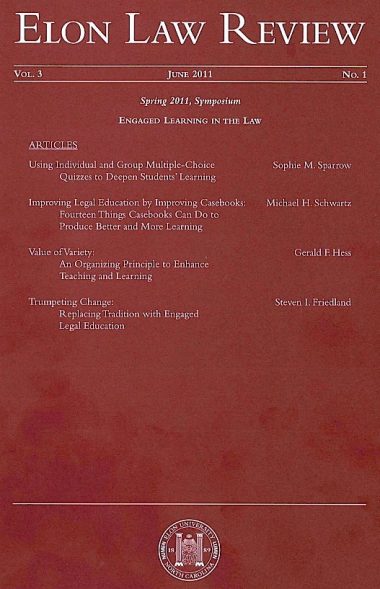Volume three, issue one of the Elon Law Review includes four articles by scholars and teachers of law who are experts in legal education pedagogy. The authors explore enhancements to casebooks, testing techniques, teaching methods, teacher evaluation, and other aspects of law school instruction to improve learning in legal education.

The publication derives from a national conference held at Elon Law on April 10, 2010, titled “Teaching for Engaged Learning.” The conference was co-sponsored by the Institute for Law School Teaching and Learning at Gonzaga University School of Law and the Center for Engaged Learning in the Law at Elon University School of Law.
In an introduction to the Elon Law Review issue, Steve Friedland, professor of law and senior scholar at Elon Law, and director of the Center for Engaged Learning in the Law, writes the following:
“From its inception, the conference was designed and implemented by a group of enthusiastic law teachers who cared deeply about their craft and profession.”
Four of the presenters at the conference, with over ninety combined years of experience in the law school classroom,, created the following articles for this edition of the Elon Law Review:
- “Using Individual and Group Multiple-Choice Quizzes to Deepen Students’ Learning.’” Sophie M. Sparrow, professor of law, University of New Hampshire School of Law
- “Improving Legal Education by Improving Casebooks: Fourteen Things Casebooks Can Do to Produce Better and More Learning.” Michael H. Schwartz, professor of law and associate dean for faculty and academic development, Washburn University School of Law
- “Value of Variety: An Organizing Principle to Enhance Teaching and Learning.” Gerald F. Hess, Smithmore P. Myers faculty scholar and co-director of the Institute for Law Teaching and Learning, Gonzaga University School of Law
- “Trumpeting Change: Replacing Tradition with Engaged Legal Education.” Steven I. Friedland, professor of law and director of the Center for Engaged Learning in the Law, Elon University School of Law
In his introduction to the publication, Friedland summarizes each article as follows:
“Professor Sparrow advances the position that multiple-choice quizzes can be a versatile learning tool. Not only can such quizzes facilitate student learning of doctrinal rules and offer feedback to both teachers and students, among other benefits, it also can be used as an effective means of developing the ability of students to engage in critical analysis and problem-solving. The article explains how to do so in a one semester course.
“Professor Schwartz opines that a particularly fertile avenue for improving legal education involves modifying the typical casebook. He has authored a casebook on Contracts embodying this approach, and suggests fourteen different ways to enhance the casebook and through that, the educational process.
“Professor Hess advocates organizing teaching and learning around the value of variety. He stresses how variety can be a preferable operational principle in several educational areas, from methods, to materials, feedback and evaluation. The incorporation of variety has many positive outcomes, especially in regards to how students learn professional knowledge, skills and values.
“Professor Friedland suggests that a blueprint for engaged education exists, based on the seminal work of undergraduate scholars. Utilizing this work, Friedland applies the blueprint to revamp and energize legal education.”
Click here for access to PDF files of each article of Volume 3, issue one, of the Elon Law Review.
The authors also recently co-authored the book, Techniques for Teaching Law 2. Click here for details.
On Friday, October 21, 2011, Elon University School of Law and the Elon Law Review will present a symposium to discuss criminal law issues emerging in the decade since the terrorist attacks of September 11, 2001. Click here for details.


